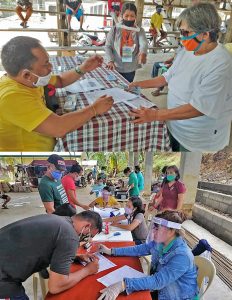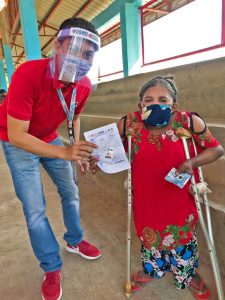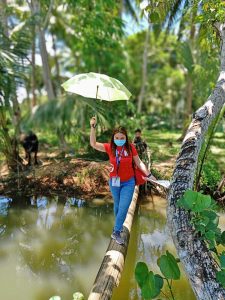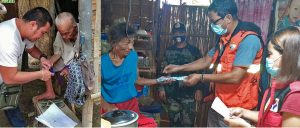Have you heard of the expression “tip of the iceberg”?
Literally, the visible surface is what we only see. This, according to the iceberg theory, is only 20% of the total size – only the tip of the iceberg. Scientifically, the largest part of an iceberg is underwater, not visible to the naked eye, and is subsequently the strongest part.
The Iceberg Theory, coined by American journalist Ernest Hemingway, is a writing style also known as the theory of omission. Just like Hemingway’s stories, our Pantawid field workers’ reports showed only a small part of what was actually happening in the field during the implementation of the Social Amelioration Program.
Believing the truth amidst turmoil

Thus, on the tail-end of the first quarter, the releasing of emergency subsidy under the SAP was lodged to the Department of Social Welfare and Development. The passage of Republic Act No. 11469, otherwise known as the “Bayanihan to Heal as One Act,” intensified the response of the national government to the needs of the Filipino citizens in this time of a pandemic.
As stipulated in RA 11469, the subsidy shall amount to a minimum of Five thousand pesos (P5,000.00) to a maximum of Eight thousand pesos (P8,000.00) a month for two months. In Caraga, wherein the minimum wage rate is P320, the minimum subsidy of P5,000 was provided for the most affected families during the Enhanced Community Quarantine who belong to the informal sector – low income or poor families.
“As much as the Agency would want to provide all the 24 million households in the nation, the national fund could only accommodate 18 million families, thus validation needs to be done to ensure prioritization of the most affected,” Mita Chuchi Lim, Regional Director of DSWD Field Office Caraga said.

Several contradicting information circulated about the program’s implementation as different interpretation of the law and the program made the rounds in social media and traditional media – “all families will receive the aid,” says some politicians. This made implementation of the program complicated, even causing turmoil among agencies and stakeholders.
Just like the tip of the iceberg, people only cared about availing of the subsidy immediately. When people were informed that not all would be covered by the program, numerous criticisms were thrown towards DSWD – “kurakot”, “buwaya”, harsh words, and baseless accusations from close-minded persons.
With misinformation came anger and frustration among people who believed they deserved, or they had the right to demand for the subsidy. And when the Agency made clear of the guidelines for the implementation, anger and frustration developed into disgust, some even resorted to violence. DSWD workers and partners from the Local Social Welfare and development Office became recipient to the ire of people demanding to be served.
Seeing beyond the iceberg’s tip
Shalom Sumaguila, 4Ps provincial link assigned in the province of Dinagat Islands, posted in her Facebook account, “I deeply felt the everyday strife of my fellows in the field. The lives of our fellow development workers and counterparts were jeopardized. Death threats, harsh words and baseless accusations were thrown against them.”
Further, she shared the strenuous process in implementing the SAP. From the validation phase, wherein they were tasked to assist the LGU in generating the potential list of beneficiaries, to the tedious process of prioritization of beneficiaries, until the distribution of the monetary assistance through strategic point areas in the Province, Pantawid Pamilya field workers were there every step of the way.
In a Bisaya poem created by Abegail Alvarez, Information Officer of Listahanan Project, she showcased the struggle of all front-liners who face criticism from the people:
Sama ninyo, kami pud apektado, (Just like you, we are also affected)
Nalayo sa pamilya, usahay burido ang ulo, (Far from our families, sometimes we are stressed out)
Apan gipili namu nga kami manerbisyo, (But we chose to serve)
Tungod kay kini ang among gipili nga trabaho. (Because we chose this calling/career)
Bisan paman niining tanan, (Amidst all of these)
Dili mi ninyo mapugngan, (You cannot stop us)
Andam gihapon mutabang sa nanginahanglan, (Ready to serve those who are in need)
Og kini ang among barugan hangtud sa kahangturan. (And this is our stand until the end)

Continuing the oath of serbisyong may malasakit
At times, abuses are too hard to handle especially when it goes beyond verbal threats. That is why a massive information drive to raise awareness and call to stop harassment among front-liners was carried out. DSWD staff and those who support social welfare workers went on to social media platforms recently to voice out their strong condemnation of harassment to those who are doing their job in serving the welfare of the people. Using the hashtags: #SupportOurFrontliners, #WeSupportLSWDO, and #IStandWithDSWD, the cause condemns all forms of harassment to front-liners.
What people do not see is the commitment of every social welfare worker in carrying out their function, especially in the implementation of the very critical social amelioration program of the government. This is the remaining part of the iceberg that people do not see. The continuous service of field workers signifies their compassion in serving the poor, marginalized, and disadvantaged. In spite of all the criticisms and the hate, front-liners are showing compassion and the courage to work under pressure and deliver their work efficiently.

So the next time you meet a front-liner or a field worker, remind yourself that you are facing someone who is selflessly serving your welfare. And even though they are tired and shaken by all the negativity, deep inside lies a heart of service, ready to provide a #SerbisyongMayMalasakit. ###(Social Marketing Section/DSWD Field Office Caraga)

